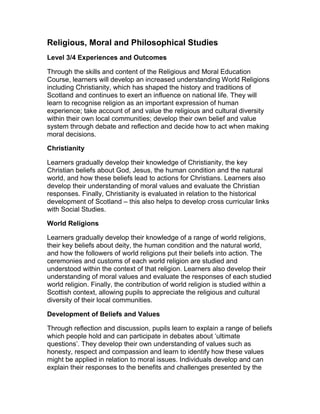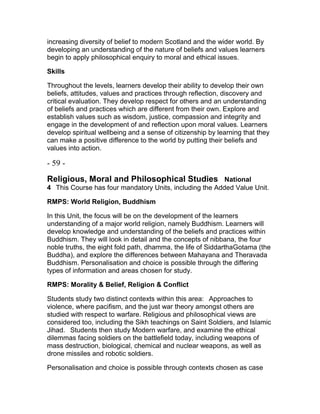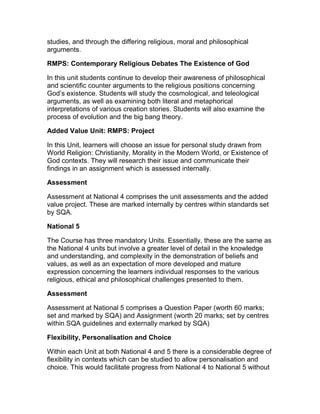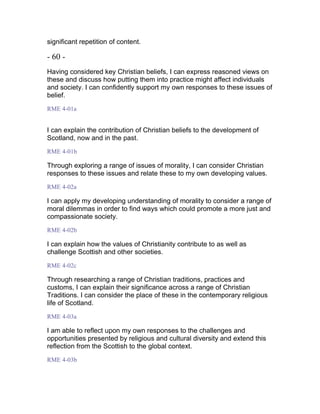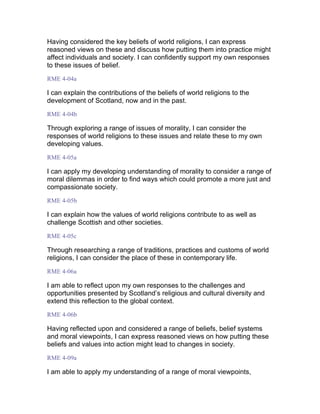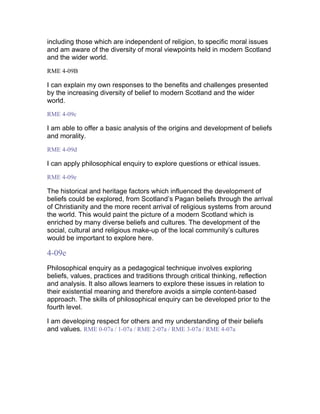Having considered key christian beliefs
- 1. Religious, Moral and Philosophical Studies Level 3/4 Experiences and Outcomes Through the skills and content of the Religious and Moral Education Course, learners will develop an increased understanding World Religions including Christianity, which has shaped the history and traditions of Scotland and continues to exert an influence on national life. They will learn to recognise religion as an important expression of human experience; take account of and value the religious and cultural diversity within their own local communities; develop their own belief and value system through debate and reflection and decide how to act when making moral decisions. Christianity Learners gradually develop their knowledge of Christianity, the key Christian beliefs about God, Jesus, the human condition and the natural world, and how these beliefs lead to actions for Christians. Learners also develop their understanding of moral values and evaluate the Christian responses. Finally, Christianity is evaluated in relation to the historical development of Scotland ÔÇô this also helps to develop cross curricular links with Social Studies. World Religions Learners gradually develop their knowledge of a range of world religions, their key beliefs about deity, the human condition and the natural world, and how the followers of world religions put their beliefs into action. The ceremonies and customs of each world religion are studied and understood within the context of that religion. Learners also develop their understanding of moral values and evaluate the responses of each studied world religion. Finally, the contribution of world religion is studied within a Scottish context, allowing pupils to appreciate the religious and cultural diversity of their local communities. Development of Beliefs and Values Through reflection and discussion, pupils learn to explain a range of beliefs which people hold and can participate in debates about ÔÇÿultimate questionsÔÇÖ. They develop their own understanding of values such as honesty, respect and compassion and learn to identify how these values might be applied in relation to moral issues. Individuals develop and can explain their responses to the benefits and challenges presented by the
- 2. increasing diversity of belief to modern Scotland and the wider world. By developing an understanding of the nature of beliefs and values learners begin to apply philosophical enquiry to moral and ethical issues. Skills Throughout the levels, learners develop their ability to develop their own beliefs, attitudes, values and practices through reflection, discovery and critical evaluation. They develop respect for others and an understanding of beliefs and practices which are different from their own. Explore and establish values such as wisdom, justice, compassion and integrity and engage in the development of and reflection upon moral values. Learners develop spiritual wellbeing and a sense of citizenship by learning that they can make a positive difference to the world by putting their beliefs and values into action. - 59 - Religious, Moral and Philosophical StudiesÔÇ¿ National 4ÔÇ¿ This Course has four mandatory Units, including the Added Value Unit. RMPS: World Religion, Buddhism In this Unit, the focus will be on the development of the learners understanding of a major world religion, namely Buddhism. Learners will develop knowledge and understanding of the beliefs and practices within Buddhism. They will look in detail and the concepts of nibbana, the four noble truths, the eight fold path, dhamma, the life of SiddarthaGotama (the Buddha), and explore the differences between Mahayana and Theravada Buddhism. Personalisation and choice is possible through the differing types of information and areas chosen for study. RMPS: Morality & Belief, Religion & Conflict Students study two distinct contexts within this area:ÔÇ¿ Approaches to violence, where pacifism, and the just war theory amongst others are studied with respect to warfare. Religious and philosophical views are considered too, including the Sikh teachings on Saint Soldiers, and Islamic Jihad.ÔÇ¿ Students then study Modern warfare, and examine the ethical dilemmas facing soldiers on the battlefield today, including weapons of mass destruction, biological, chemical and nuclear weapons, as well as drone missiles and robotic soldiers. Personalisation and choice is possible through contexts chosen as case
- 3. studies, and through the differing religious, moral and philosophical arguments. RMPS: Contemporary Religious Debates The Existence of God In this unit students continue to develop their awareness of philosophical and scientific counter arguments to the religious positions concerning GodÔÇÖs existence. Students will study the cosmological, and teleological arguments, as well as examining both literal and metaphorical interpretations of various creation stories. Students will also examine the process of evolution and the big bang theory. Added Value Unit: RMPS: Project In this Unit, learners will choose an issue for personal study drawn from World Religion: Christianity, Morality in the Modern World, or Existence of God contexts. They will research their issue and communicate their findings in an assignment which is assessed internally. Assessment Assessment at National 4 comprises the unit assessments and the added value project. These are marked internally by centres within standards set by SQA. National 5 The Course has three mandatory Units. Essentially, these are the same as the National 4 units but involve a greater level of detail in the knowledge and understanding, and complexity in the demonstration of beliefs and values, as well as an expectation of more developed and mature expression concerning the learners individual responses to the various religious, ethical and philosophical challenges presented to them. Assessment Assessment at National 5 comprises a Question Paper (worth 60 marks; set and marked by SQA) and Assignment (worth 20 marks; set by centres within SQA guidelines and externally marked by SQA) Flexibility, Personalisation and Choice Within each Unit at both National 4 and 5 there is a considerable degree of flexibility in contexts which can be studied to allow personalisation and choice. This would facilitate progress from National 4 to National 5 without
- 4. significant repetition of content. - 60 - Having considered key Christian beliefs, I can express reasoned views on these and discuss how putting them into practice might affect individuals and society. I can confidently support my own responses to these issues of belief. RME 4-01a I can explain the contribution of Christian beliefs to the development of Scotland, now and in the past. RME 4-01b Through exploring a range of issues of morality, I can consider Christian responses to these issues and relate these to my own developing values. RME 4-02a I can apply my developing understanding of morality to consider a range of moral dilemmas in order to find ways which could promote a more just and compassionate society. RME 4-02b I can explain how the values of Christianity contribute to as well as challenge Scottish and other societies. RME 4-02c Through researching a range of Christian traditions, practices and customs, I can explain their significance across a range of Christian Traditions. I can consider the place of these in the contemporary religious life of Scotland. RME 4-03a I am able to reflect upon my own responses to the challenges and opportunities presented by religious and cultural diversity and extend this reflection from the Scottish to the global context. RME 4-03b
- 5. Having considered the key beliefs of world religions, I can express reasoned views on these and discuss how putting them into practice might affect individuals and society. I can confidently support my own responses to these issues of belief. RME 4-04a I can explain the contributions of the beliefs of world religions to the development of Scotland, now and in the past. RME 4-04b Through exploring a range of issues of morality, I can consider the responses of world religions to these issues and relate these to my own developing values. RME 4-05a I can apply my developing understanding of morality to consider a range of moral dilemmas in order to find ways which could promote a more just and compassionate society. RME 4-05b I can explain how the values of world religions contribute to as well as challenge Scottish and other societies. RME 4-05c Through researching a range of traditions, practices and customs of world religions, I can consider the place of these in contemporary life. RME 4-06a I am able to reflect upon my own responses to the challenges and opportunities presented by ScotlandÔÇÖs religious and cultural diversity and extend this reflection to the global context. RME 4-06b Having reflected upon and considered a range of beliefs, belief systems and moral viewpoints, I can express reasoned views on how putting these beliefs and values into action might lead to changes in society. RME 4-09a I am able to apply my understanding of a range of moral viewpoints,
- 6. including those which are independent of religion, to specific moral issues and am aware of the diversity of moral viewpoints held in modern Scotland and the wider world. RME 4-09B I can explain my own responses to the benefits and challenges presented by the increasing diversity of belief to modern Scotland and the wider world. RME 4-09c I am able to offer a basic analysis of the origins and development of beliefs and morality. RME 4-09d I can apply philosophical enquiry to explore questions or ethical issues. RME 4-09e The historical and heritage factors which influenced the development of beliefs could be explored, from ScotlandÔÇÖs Pagan beliefs through the arrival of Christianity and the more recent arrival of religious systems from around the world. This would paint the picture of a modern Scotland which is enriched by many diverse beliefs and cultures. The development of the social, cultural and religious make-up of the local communityÔÇÖs cultures would be important to explore here. 4-09e Philosophical enquiry as a pedagogical technique involves exploring beliefs, values, practices and traditions through critical thinking, reflection and analysis. It also allows learners to explore these issues in relation to their existential meaning and therefore avoids a simple content-based approach. The skills of philosophical enquiry can be developed prior to the fourth level. I am developing respect for others and my understanding of their beliefs and values. RME 0-07a / 1-07a / RME 2-07a / RME 3-07a / RME 4-07a

